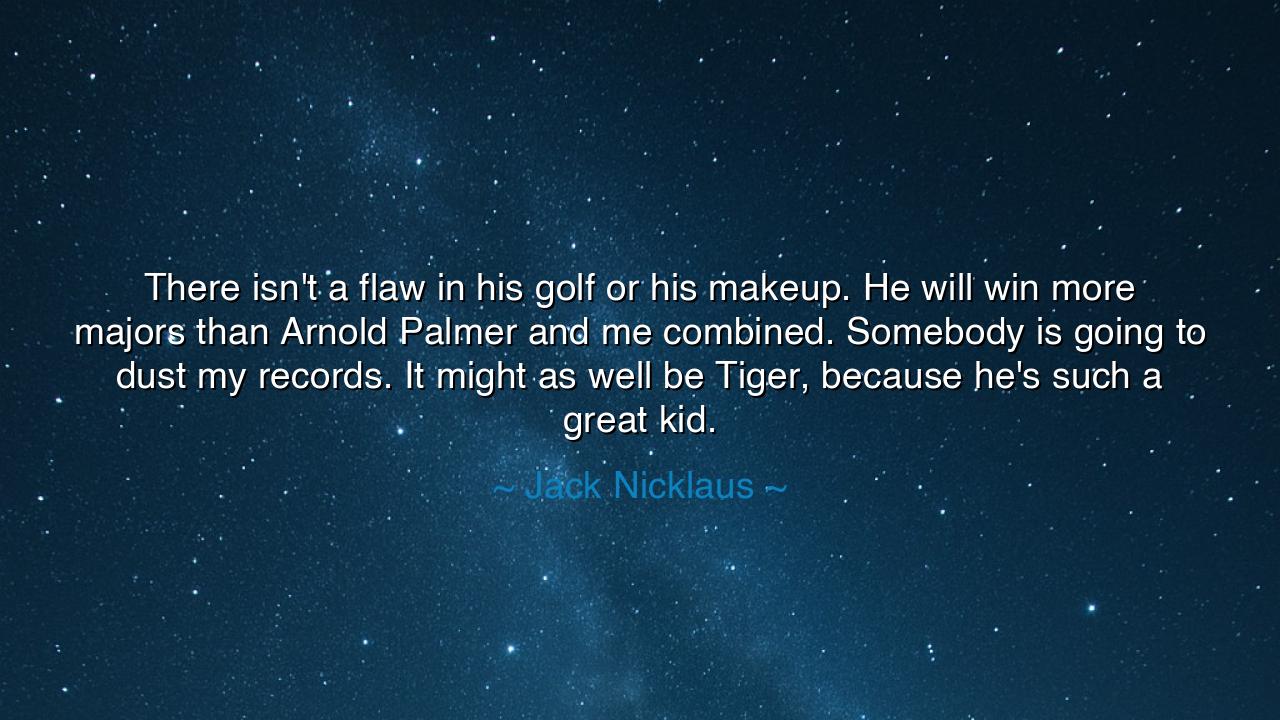
There isn't a flaw in his golf or his makeup. He will win more
There isn't a flaw in his golf or his makeup. He will win more majors than Arnold Palmer and me combined. Somebody is going to dust my records. It might as well be Tiger, because he's such a great kid.






Hearken, O seekers of reverence and admiration, and attend the words of Jack Nicklaus, the Golden Bear, who spoke with both humility and awe: “There isn't a flaw in his golf or his makeup. He will win more majors than Arnold Palmer and me combined. Somebody is going to dust my records. It might as well be Tiger, because he's such a great kid.” In these words lies a profound acknowledgment of talent, legacy, and the inevitability of greatness surpassing its predecessors, tempered by respect and admiration for the next generation of champions.
The origin of this insight rests in Nicklaus’s own life as a master of golf, whose triumphs and records became benchmarks of excellence. Observing Tiger Woods, Nicklaus recognized a prodigious skill that rivaled and would inevitably surpass even the accomplishments of those he revered most. His words capture the ancient truth that human achievement is cumulative and evolutionary: each generation stands upon the shoulders of giants, yet surpasses them in ways unimaginable to those who came before.
Consider the story of Alexander the Great, whose teachers, including Aristotle, recognized his exceptional mind and valor. Even as his mentors achieved greatness in philosophy and thought, they acknowledged that Alexander’s exploits in conquest and strategy would eclipse their own. In the same manner, Nicklaus perceives Woods not as a rival to diminish, but as a force whose extraordinary talent will rewrite the annals of golf, honoring legacy while creating new horizons of achievement.
Yet Nicklaus’s observation carries a deeper meaning: greatness inspires admiration, humility, and mentorship, not envy or resentment. To proclaim that someone will surpass your records is to acknowledge the continuity of excellence and the virtue of celebrating achievement wherever it manifests. In recognizing Woods as “such a great kid,” Nicklaus embodies the spirit of encouragement, showing that human greatness is not finite but shared and progressive.
The ancients understood this principle well. In Greek athletics, poets would celebrate victors while acknowledging the inevitability of new champions. Pindar’s odes extolled the deeds of athletes yet accepted that time and skill would produce successors who eclipsed former glory. Nicklaus’s words echo this enduring wisdom: legacy is not diminished by succession; it is enhanced by the triumph of those who continue the pursuit of excellence.
From this reflection, a lesson emerges: embrace the achievements of others as inspiration, and recognize that excellence is a continuum. One’s own accomplishments are not diminished by the brilliance of successors; rather, they are honored through the ongoing advancement of the craft, discipline, or art that one helped shape. True wisdom lies in celebrating progress, in mentoring, and in acknowledging talent wherever it shines.
Practical action follows naturally: cultivate your craft with dedication, pursue excellence relentlessly, and celebrate the achievements of those who follow. Seek to inspire, to mentor, and to pass knowledge forward, understanding that greatness is not a solitary pursuit but a shared journey across generations. By doing so, one contributes to a legacy that endures beyond personal records or accolades.
Thus, let the words of Jack Nicklaus endure: greatness is both personal and communal, a flame that passes from hand to hand. Honor the skill of others, embrace the inevitability of successors, and recognize that legacy is built not merely in records, but in the continuity of excellence, admiration, and the courage to surpass the past. In celebrating the prodigy, one honors the enduring spirit of human achievement itself.






AAdministratorAdministrator
Welcome, honored guests. Please leave a comment, we will respond soon